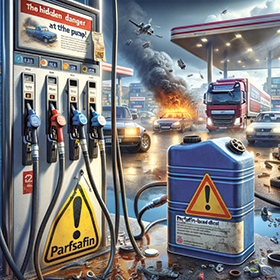
Fuel adulteration is one of the most insidious threats to industrial machinery, safety and environmental compliance. Craig FitzGerald, chief executive officer of ISO-Reliability Partners, discusses how this widespread issue undermines mechanical performance and operational safety, and also poses significant legal and financial risks. “Adulterated fuel is not just a matter of poor performance; it is a direct threat to equipment integrity, worker safety and environmental sustainability,” says FitzGerald. “The problem is far more prevalent than many realise, and the consequences are escalating.”
Quality concerns
At the heart of the issue is the adulteration of diesel with substances such as illuminating paraffin (IP), used transformer oil and gear oils. These significantly degrade fuel quality. “IP, for instance, drastically reduces diesel’s lubricity, which is essential for the protection of high-pressure fuel injection systems. Without proper lubrication you are essentially guaranteeing elevated costs, premature wear and mechanical failure,” explains FitzGerald.
In addition, adulteration alters the fuel’s viscosity and density, directly affecting combustion efficiency and engine output. The result is increased maintenance frequency, unexpected breakdowns and far higher operational costs. “We are seeing cases where seemingly minor dilution leads to major engine damage, because the physical and chemical properties of the fuel are no longer within operational parameters,” he adds.
Safety risks and invisible hazards
The safety implications extend well beyond engine wear. Used transformer oil, a common adulterant, often contains polychlorinated biphenyls (PCBs), a class of highly toxic chemicals strictly regulated under the Basel Convention. “The combustion of PCBs in engines produces extremely harmful by-products, including hydrogen chloride and dioxins, many of which are carcinogenic and mutagenic,” notes FitzGerald. “When you are running adulterated fuel, you are creating chemical hazards that affect both operators and the broader environment.”
Mechanical reliability is also compromised. Poor fuel quality can cause diesel engines to fail under load, potentially creating hazardous conditions, particularly in heavy industrial or transport environments.

Environmental and economic fallout
Fuel adulteration does not just harm equipment and people, it undermines environmental protections and public finances. “This practice allows for the illegal disposal of hazardous industrial oils, leading to long-term soil, air and groundwater contamination,” says FitzGerald. “It is a form of environmental abuse hiding in plain sight.”
The economic consequences are staggering. FitzGerald says that losses to the South African fiscus from fuel adulteration and associated tax evasion are estimated to exceed R3,6 billion annually.
Proactive industrial measures
FitzGerald advocates for a combination of advanced technology and sound procurement practices to combat adulteration. Real-time sensor technology like the Yateks Africa FuelTrust system allows for real-time onsite detection of critical fuel parameters, including density, viscosity, dielectric constant (which flags contaminants such as paraffin and PCBs), moisture content and temperature. These sensors are particularly suited for continuous monitoring in high-volume operations. In addition to technological solutions, regular fuel sampling, laboratory testing and comparative analysis against EN590 standards are essential. “It is critical to analyse lubricity and chemical composition to avoid nasty surprises,” he continues.
Accountability from suppliers
ISO-Reliability Partners advises industries to tighten their fuel procurement standards. FitzGerald recommends demanding written certification of compliance with EN590 or similar recognised standards, batch test results for viscosity, density and sulphur, and contractual audit rights. “Fuel suppliers must be held accountable. Choose branded suppliers with traceability and a reputation to lose,” he advises.
Pursuing accountability
He also emphasises the value of contractual protection as a legal deterrent. “Include clauses that enforce penalties for non-compliance, allow immediate termination if adulteration is detected and mandate traceable sourcing. When adulterated fuel causes equipment failure, industries have strong legal recourse, provided evidence supports the claim. “If damage can be forensically linked to contaminated fuel and a supplier is found to have breached contract or acted negligently, litigation is absolutely viable,” explains FitzGerald.
South Africa’s National Environmental Management Act regulates substances like PCBs, while the Consumer Protection Act supports claims of defective or misrepresented fuel. He explains that service-level agreements provide the foundation for enforcing quality expectations and pursuing legal remedy. He also notes that government oversight is catching up. The Department of Mineral Resources and Energy confirmed over 70 failed fuel samples in a recent inspection.
As South Africa’s industrial sector grapples with economic pressures and environmental challenges, ensuring fuel integrity has become non-negotiable. “The time for passive reliance on fuel suppliers is over. With the right tools, contracts and vigilance, industries can protect their machinery, personnel and the environment,” concludes FitzGerald.
For more information contact ISO-Reliability Partners,

© Technews Publishing (Pty) Ltd | All Rights Reserved